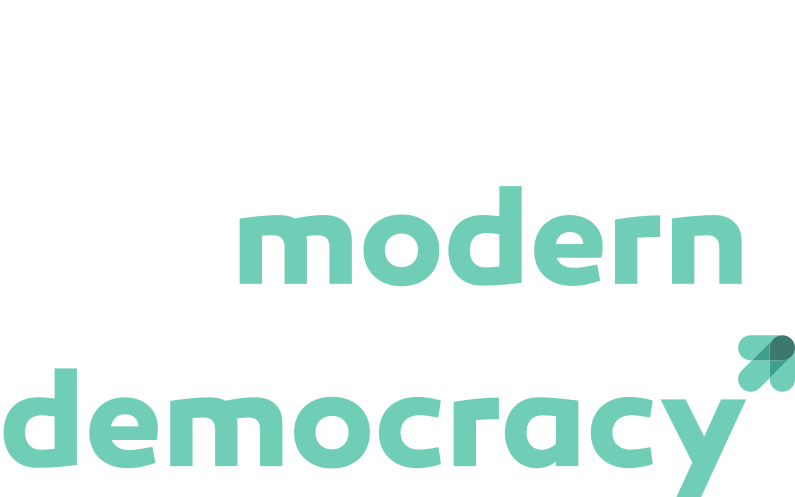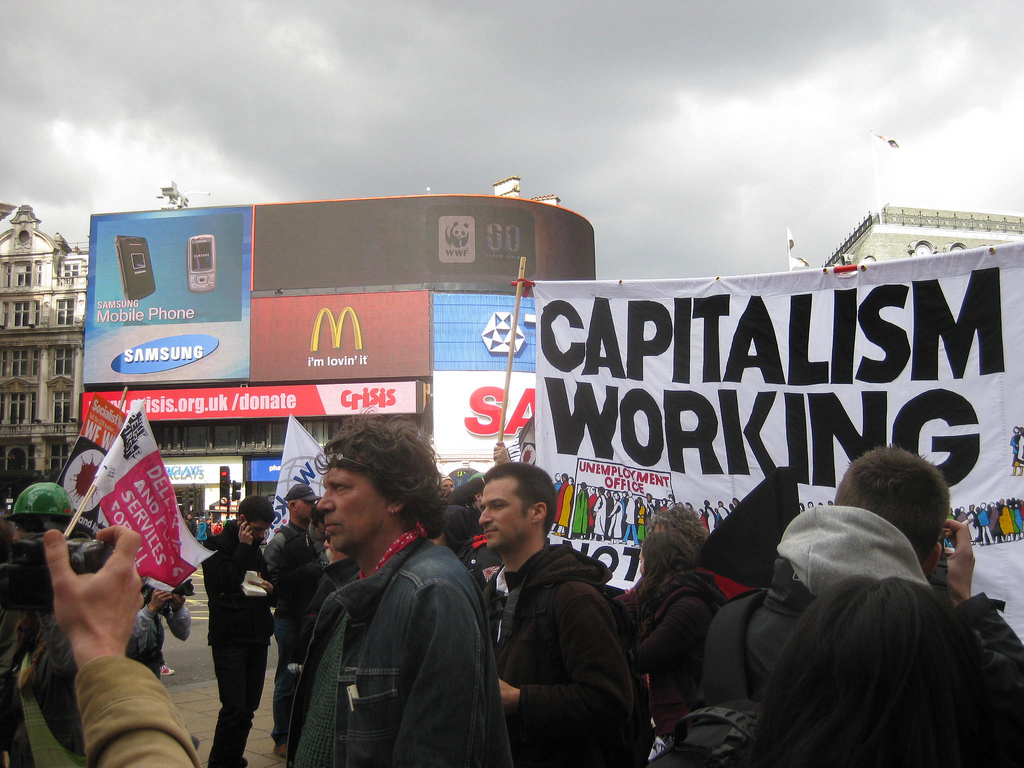The Project for Modern Democracy is embarking on a new research project, Morality & Markets. Our aim is to examine the causes of the current crisis of confidence in the ability of markets to deliver prosperity for all. We will seek to identify practical steps to restore faith that markets can operate in the interests of all society.
The Problem
It has been almost 30 years since the fall of the Berlin Wall, and for most of that time the debate between capitalism and socialism that prevailed throughout the Cold War has been dormant, with successive governments adopting broadly pro-market policies. The basic bargain established during the 1980s, according to which lower taxes and less interventionist policies would ensure higher growth and rising living standards, was widely accepted. For an entire political generation, the tone of mainstream economic policymaking became managerial in character: the question was not whether capitalism works, but which version of capitalism works best.
In the long-tail aftermath of the financial crisis and the great recession, a succession of unforeseen political events across the Western world have been overturning previously unquestioned assumptions. In Britain, the election of Jeremy Corbyn as leader of the Labour Party in 2015 was an early sign that the tectonic plates of politics were shifting. This was followed in 2016 by Britain’s decision to leave the European Union, with people in the most economically impoverished regions voting ‘leave’ in greater numbers. A few months later, dissatisfaction with the economic status quo contributed to Donald Trump’s unexpected victory in the 2016 American Presidential Election. In Germany, where nationalist politics has generally been viewed with suspicion since the Second World War, and where the dominant economic model is quite distant from that of Anglo-American liberalism, the far-right and Eurosceptic Alternative für Deutschland won 94 seats in the 2017 federal election, the first time it had won any seats in the Bundestag. Emmanuel Macron may have won France’s 2017 presidential election on a centrist platform, but the fact that the far-right nationalist Marine Le Pen made it to the second round and won 33.9 per cent of the vote showed that France was also not immune to the populist surge.
The common thread linking these events is popular discontent with the status quo and a growing perception that the present economic model is not working for most people. In September 2017, only 17 per cent of respondents to a YouGov poll agreed that “capitalism is working well.” A poll conducted by Populus in 2017 found that 42 per cent of Britons chose ‘greedy’ as one of their top three associations with capitalism, and that those aged 35 and older were in fact slightly more anti-free enterprise than younger generations. A Number Cruncher Politics poll from earlier this year showed more ambivalence toward the concept of free enterprise, but worrying underlying attitudes, with 61% of people disagreeing with the statement “ordinary working people get their fair share of the nation’s wealth”, and 64% agreeing that “there is one law for the rich and one for the poor”. The 2018 Edelman Trust Barometer found that 40 per cent of Britons reported anxieties over increasing inequality in society, while 36 per cent believed that their standard of living was likely to get worse over the course of the year.
Some of these perceptions may be improved by reframing the contemporary debate or making pragmatic arguments about the best policies for Britain’s future, but other aspects of the public’s scepticism toward the dominant economic model have clearer underlying causes and will not necessarily be assuaged by the force of ‘better arguments’. The British ‘productivity puzzle’, highlighted by the Office for Budget Responsibility during the Coalition years, remains unsolved. Inequality of access to property and property ownership has never been so starkly visible. And, with the major structural shifts, environmental effects, and technological innovations promised by current events, uncertainty is impacting upon public and market alike.
It is striking that even the good news stories about our economy are often taken as only a veneer of positivity, plastered over the far more commonplace lived experience of economic uncertainty. Employment levels are near a record high, yet serious concerns are raised about the rising numbers of economically inactive people and the wider sustainability of the changing job market, with one in eight workers in a state of in-work poverty. Similarly, despite some recent signs of improvement, real-terms wage growth never quite recovered from the recession and only progressed sluggishly since 2011.
These underlying trends cannot be imagined away or made sweeter by a more optimistic, market-friendly perspective. New analyses and fresh ideas are needed.
Our project
We wish to identify policies which will make the average citizen better off and renew faith in the essential role played by markets in the prosperity of the British people.
To achieve this, the economic system must be structured in a way that is demonstrably fair and creates positive rather than perverse incentives. Markets flourish within reasonable and predictable regulatory constraints: the notion of truly ‘free-market’ capitalism is an idealised economists’ model that has never existed, and could not exist, in the real world. To address means synthesising a new equilibrium: fostering an economically literate acceptance of the role of the state in encouraging competition and safeguarding public interests without tipping over into overweening statism; recognition of the positive, productive capacities of market forces without reproduction of laissez-faire dogmatism.
With these objectives in mind, our project will take a distinctive approach, engaging with four representative policy areas through the lens of systematic stages of analysis: an account of the main symptoms of our current problems, a diagnosis of their underlying causes, a prognosis for the future if current trends continue, and suggested public policy remedies. Our main policy areas will be:
1. Stagnant wages and productivity growth
After steadily rising by an average of 2 per cent a year for much of the last 50 years, real wages fell significantly after the 2008 financial crisis before settling in 2013/14 and are still, by some measures, below pre-crisis levels. Productivity growth, the key driver of income growth over the long run, has likewise stalled. Had the pre-crisis trend in productivity growth continued, hourly earnings would be almost 20 per cent higher today. This pressure on living standards is a significant cause for dissatisfaction with the current market system.
2. The changing nature of employment
The standard employment model, by which individuals work a fixed number of hours for as single employer with defined statutory benefits, is giving way to alternative forms of employment. The past decade has seen the emergence of the gig economy, within which self-employed workers are connected to customers through digital platforms that position themselves as ‘matchmakers’ rather than employers. On the one hand, this has created jobs and given millions of people the flexibility to work the hours that suit them. On the other, it has also raised questions about what self-employed workers should expect in terms of sick pay, leave, job security and future prospects. The Taylor Review, an independent review of modern working practices commissioned by Theresa May in October 2016, recognised that flexibility in the workplace was important and had contributed to record unemployment, but warned that some employment arrangements resulted in ‘one-sided flexibility’ in which workers assumed risk on behalf of their employers. The report recommended that workers for gig economy employers such as Uber and Deliveroo be classed as ‘dependent contractors’, and that strategies be put in place to make sure workers do not get stuck on the National Living Wage which no possibility of a raise. We will explore what these strategies could look like in practice,
3. The impact of globalisation and automation
Globalisation has brought down the cost of consumer products, enhanced productivity, increased global prosperity, lifted millions out of poverty, and spread values such as democracy and human rights. But it has also created winners and losers, with low-skilled workers in developed countries sometimes losing out to cheaper competition from abroad. This has meant higher salaries and living standards for some highly educated employees but stagnant wages and job losses for others. Automation is likely to improve productivity and incomes dramatically, but it also has the potential to bifurcate the workforce into highly paid specialists who benefit from technological advances and relatively unskilled, low-paid workers who do not.
4. Corporate behaviour
While the issues described above have disadvantaged workers, corporations have benefited from lower corporation tax and the proliferation of tax havens. The UK has a sizeable ‘tax gap’ between tax liabilities and taxes actually collected by HMRC, with estimates ranging from GBP 3bn to 12bn a year, and a few multinational corporations have succeeded in avoiding the majority of their tax liabilities by shifting their profits internally to headquarters in tax havens. This disadvantages smaller-scale enterprises and risks undermining faith in the fairness of the market system. Loopholes will always be exploited where they exist, but it is the responsibility of the state to close them.
Our aims
After providing our diagnosis of the problems facing modern capitalism and prognosis for the future, we will suggest practical solutions in each of these key policy areas, highlighting illustrative examples of new thinking which could be particularly effective. We will publish work iteratively on this blog, and provide a platform for contributions from thought-leaders from across the political spectrum.
We do not have to be pessimistic about the present challenges facing the economy and society. For the most part, they are the result of markets not working as expected, rather than an existential threat to the capitalist system itself. But addressing them will require policymakers to recognise that the pre-crash economic consensus is no longer working for everyone, to address causes rather than symptoms, and to regain the confidence to use various policy levers which have gathered dust, so that markets operate consistently in the interests of society.
Please subscribe to be kept informed of the latest output from the Morality & Markets team, follow P4MD on Twitter, and do consider supporting our research by donating. The blog will be updated regularly, so check back soon.
Dr Simon Kaye is the Research Director for the Morality & Markets Project at P4MD.
Christopher Howarth is Chief of Staff for P4MD and the Rt Hon Nick Herbert CBE MP.

